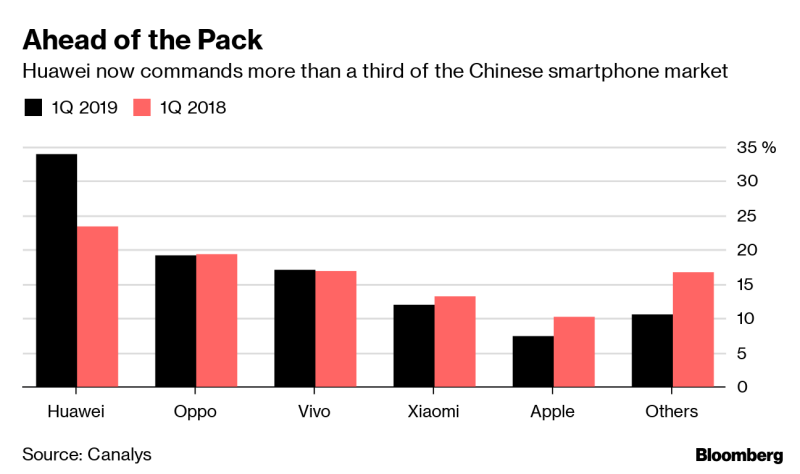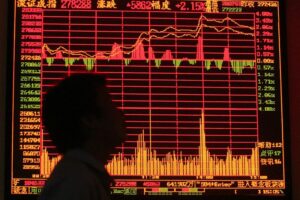

(Bloomberg) — Sign up for Next China, a weekly email on where the nation stands now and where it’s going next.
Huawei Technologies Co. is preparing for a 40% to 60% drop in international smartphone shipments as the Trump administration’s blacklisting hammers one of the Chinese tech giant’s most important businesses.
China’s largest technology company is crunching internal estimates and exploring options including pulling the latest model of its marquee overseas label, the Honor 20, people familiar with the matter say. The device begins selling in parts of Europe June 21 including France and the U.K., but executives are monitoring the launch and may cut off shipments if it sells poorly as expected, they said, asking not to be identified discussing internal matters. Already, two of France’s largest carriers aren’t bothering with the Honor at all, two people familiar with the matter said.
Huawei sales and marketing managers are internally charting a drop in volumes of anywhere between 40 million to 60 million smartphones this year, the people said. That’s a big chunk of an international business that in 2018 accounted for almost half of the 206 million phones it moved. The unusually wide range underscores the uncertainty gripping Huawei, a Chinese national champion that Washington accuses of aiding Beijing in espionage — something the company has repeatedly denied.
The U.S. in May blacklisted Huawei, choking off the American components and software it needs to run its businesses. That includes updates for the Google Android system that powers all its smartphones abroad. Without that software, devices like the Honor 20 wouldn’t be able to run critical apps like Google Maps and Gmail.
“Huawei will lose access to Play Store and key Google apps like YouTube and Gmail. Users will have to sideload or look for alternative app stores,” Counterpoint analyst Tom Kang wrote in a report following the ban. “The impact on emerging markets will vary. However, Europe, Japan, and Latin America will be heavily affected.”
Huawei, a smartphone vendor with volumes second only to South Korea’s Samsung Electronics Co., declined to comment on the estimates. Huawei spokesman Glenn Schloss said launches were “proceeding.”
Priced at 399 pounds ($500), the Honor 20 runs on the most advanced Android 9 software and is the latest in a line that’s won over budget-conscious consumers, including in the U.S. While it’s powered by the company’s own Kirin chip, meaning it doesn’t need Qualcomm Inc. processors, the ban will hamstring consumers’ ability to update the OS or download the latest Google apps.
Longer term, Huawei is developing more of its own chips and mobile software to reduce its reliance on foreign technology. The company is delving into higher-end areas such as foldable devices. But it’s delaying the launch of the foldable Mate X to September to conduct more testing, CNBC cited a spokesperson as saying last week. Huawei has also touted a self-developed operating system as an Android alternative, but it will take time for the Chinese company to persuade developers across the globe to create separate apps tailored for the OS.
Faced with lukewarm international demand, Huawei — which in 2018 overtook Apple Inc. to become the world’s No. 2 smartphone vendor — is turning inward.
Huawei aims to grab as much as half of the smartphone market in China in 2019 to offset the decline overseas, the people said, citing internal discussions about year-end goals. While the domestic market is shrinking, Huawei hopes to boost shipments by investing in marketing and expanding distribution channels, one of the people said. Some executives have argued that the target was too high to achieve, the person added.
Huawei’s China smartphone market share could grow to as much as 45% versus a previous estimate of between 30%-35% thanks to “a more proactive sales strategy” after the Trump ban, TF International analyst Ming-Chi Kuo wrote in a report on Wednesday.
–With assistance from Angelina Rascouet.
To contact Bloomberg News staff for this story: Gao Yuan in Beijing at [email protected]
To contact the editors responsible for this story: Edwin Chan at [email protected], ;Peter Elstrom at [email protected], Colum Murphy
<p class="canvas-atom canvas-text Mb(1.0em) Mb(0)–sm Mt(0.8em)–sm" type="text" content="For more articles like this, please visit us at bloomberg.com” data-reactid=”37″>For more articles like this, please visit us at bloomberg.com
©2019 Bloomberg L.P.














